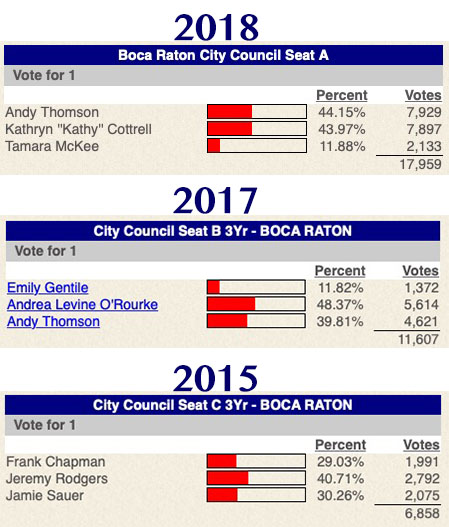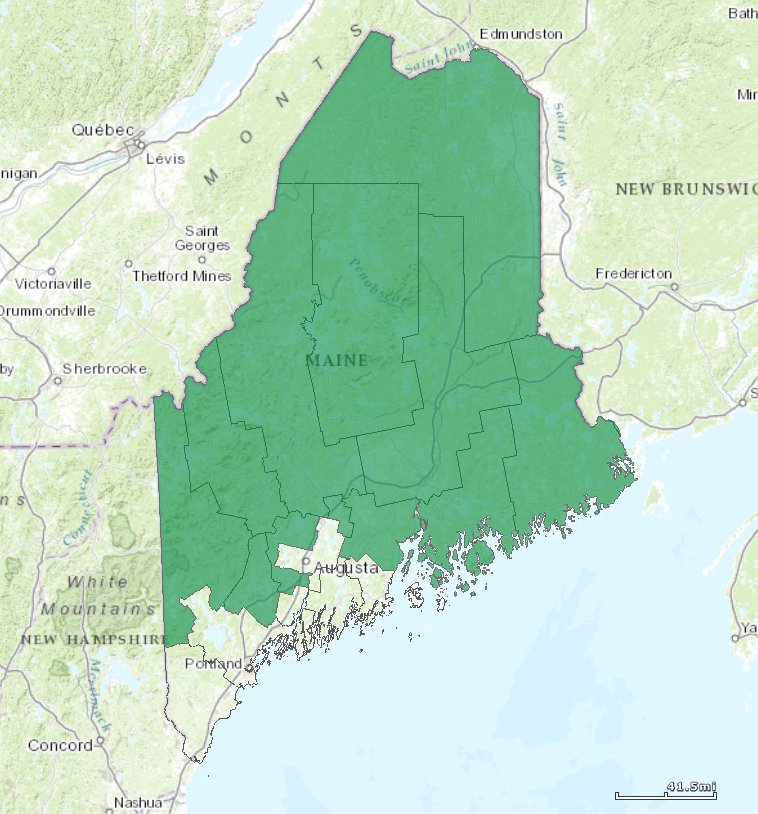As explained in previous BocaFirst articles How to Best Elect the People’s Choice and Why Ranked Choice May be Boca’s Best Choice, Ranked Choice Voting (RCV) is now an accepted way of determining the will of voters because it inherently solves the problems that arise when more than two people run for office. It’s also known and accepted as a way to make other types of decisions of a similar nature where there’s more than two choices. If you would like Boca Raton to use it, tell your City Council “I want Boca to use Ranked Choice Voting for Municipal Elections”:

As shown (L to R):
Jeremy Rodgers jrodgers@ci.boca-raton.fl.us
Andrea Levine O’Rourke aorourke@ci.boca-raton.fl.us
Mayor Scott Singer ssinger@ci.boca-raton.fl.us
Monica Mayotte mmayotte@ci.boca-raton.fl.us
Andy Thomson athomson@myboca.us
The “Plurality Without Runoff” system used by Boca Raton can only determine the will of voters when there’s two candidates. This is because mathematically, the plurality system only works for two choices. It can be made to work for three or more as long as there’s a runoff between the top two. The election laws used by Boca Raton do not allow for a runoff.
Fair minded citizens considering the merits of RCV should be wary of junk science and opinion polls. In a city with a historical legacy of dark money funded negative campaigning, special interests have the most to lose with Ranked Choice Voting.
There are other types of voting systems such as “anti-plurality”, “sequential pairing” and “approval voting”. But of them all, plurality voting does the poorest job when there is no majority winner. Just looking at the three basic possibilities with RCV and Plurality, Boca Raton uses the worst one.
- Ranked Choice Voting
- Plurality Voting with runoff
- Plurality Voting
… where Andy Thompson got only 44% of the vote … Boca’s version of plurality voting failed to determine the majority’s choice
When a candidate wins with a majority vote, there’s no difference between RCV and how voting works today. But when there is no majority winner, Boca Raton’s variant of plurality voting without a runoff fails to determine the majority choice. RCV on the other hand, is even better than “plurality with a runoff” because it has the run off built in with instant results. So if the goal is to determine which candidate is preferred by the majority of voters, RCV floats to the top of the pack. RCV not only saves time and taxpayer money but it tallies the runoff at the time of the election and not in a special election later.
Boca’s Recent Elections

In the tight 3-way race last August where Andy Thompson got 30 more votes than Kathy Cotrell, he failed to get a majority of the vote (44%). In fact the same was true in 2017 when Andrea O’Rourke won with 48% and in 2015 when Jeremy Rodgers won with 40%. Boca’s “plurality without runoff” system failed to determine the majority’s choice. Thats because Boca’s system is incapable of determining who represents the majority of voters when nobody gets a majority vote. The result is that the majority of voters are represented by a candidate elected by a minority.
The Ranked Choice Voting and plurality WITH a runoff do determine the majority’s choice because they capture the voter’s second choice. Here’s a quick video on how RCV works:
How Does Ranked Choice Voting Work? from The UpTake on Vimeo.
Plurality With Runoff vs Ranked Choice Voting
Plurality voting works great if only two people are running. In order for it to choose the majority candidate, it has to have a runoff between the top two when no candidate gets a majority. RCV has the advantage because it has the runoff built in and is done instantly. No costly runoff election is required. But RCV has other advantages. In his analysis of RCV, mathematician Dr. Michael Lazlo of Nova Southeastern University, College of Computer Science pointed out another aspect of RCV particularly relevant to Boca Raton. He wrote:
“RCV reduces the incentive for negative campaigning because legitimate candidates are better served by seeking second-place votes”.
RCV enables voters the freedom to vote their conscience without risking the election being won by the candidate you like the least; arguably what any patriot would want.
Fair minded citizens considering the merits of RCV should be wary of junk science and opinion polls. In a city with a historical legacy of dark money funded negative campaigning, special interests have the most to lose with RCV. So be wary of those who speak out against RCV. You need go no further than Google to discover RCV has already been adopted in Maine, Minnesota and California.
RCV IN Practice

Intrigued by RCV and wanting to know more, a BocaFirst reader contacted a friend in Maine where they use RCV. They also recently had an election where under the plurality without runoff system, the winner would have been determined by a block of minority voters. But under RCV, the the winner in Maine was declared based on the person who actually got the most total votes. Let that sink in a minute.
Here is the real world experience in Maine where residents fought back against special interests and implemented RCV in an overwhelming referendum against their “plurality without runoff” system. Take note how RCV enables voters the freedom to vote their conscience without risking the election being won by the candidate you like the least; arguably what any patriot would want:
From Andrew Pollack (Maine 1st District):
RCV is the only system I’ve seen that really addresses the problems of having a minority candidates winning elections. RCV eliminates the problem of “throwing away” your vote on your personal favorite candidate when they are unlikely to win, and having that vote for an unlikely but appealing candidate actually end up helping elect the candidate you least want in the job.
The plurality system used in most places is hostile to third party and independent candidates. RCV lets voters actually pick third party candidates first, and in the case of a split vote, still lets them vote for the next best candidate (in their opinion) over the least liked (to them).
The only thing that comes close is a runoff process. Those are expensive, time consuming, and represent the will of the people at the time of the runoff not the time of the election. Outside interests pay even more attention in runoffs as well, making them even less accurate representations of the will of local voters.
Here in Maine, district two generally votes moderately conservative but is very mixed. Many conservative voters, however, were not happy with the Republican candidate’s record. Those against him were split between a liberal and a moderate. As a result, only those on the furthest right, a minority of voters, picked the republican incumbent (Poliquin). Those on the far left tended to pick the far left candidate who also got an even smaller minority of votes.
Using the old way, Poliquin would have won with a minority of votes — most people would end up represented by their least preferred pick.
With RCV, when the candidates with the least votes were dropped and their supporters’ second choices were applied, the total swung to Jared Golden. More people, in total, expressed a clear preference for Golden over Poliquin.
In the end, the result better represented the best approximation of the actual desire of the voters.
People who voted for the candidates with the least votes were not ignored as a result. The freedom to express your opinion with your first choice did not cost you the penalty of electing the one you least liked.
Yes, it took longer to count. In large part because our former Governor fought RCV to the end, and refused to allocate funds to a system which could automate the subsequent rounds of counting and it had to be done by hand. The delay did not ultimately cause any problems for anyone other than reporters who wanted to talk about the winner on election night.
Those against RCV say “but Poliquin got more votes”, however that is not true. In total, more people checked a box for Golden than Poliquin, even if it was a second choice. Our courts held that Mainers knew what they were doing in he voting booth. We understood how RCV would let us pick an unlikely first choice while still being against reelecting an incumbent. Had RCV not been in place, the most likely outcome would have been far fewer third party and independent votes as it was effectively a two candidate race.
Mainers have overwhelmingly voted to use RCV in two referenda, and many of us look forward to meeting the legal requirements to extended that system to the race for Governor as well.

